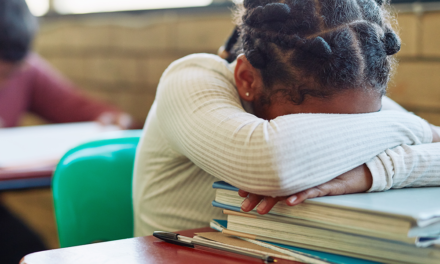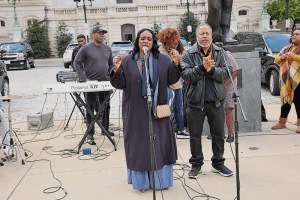By Kate Seltzer,
Capital News Service
The number of books people tried to ban from schools and libraries nearly tripled between 2019 and 2021, according to data from the American Library Association (ALA). The ALA Office for Intellectual Freedom tracked 729 challenges to 1,597 separate book titles in 2021. That’s up from 377 challenges to 566 book titles in 2019.
“It’s a situation that I’ve never witnessed in the two decades I’ve worked for the Office for Intellectual Freedom and a real change in the nature of the demands to censor books,” said Deborah Caldwell-Stone, director of the organization.
In 2021, the ten most commonly banned books according to the ALA were “Gender Queer,” “Lawn Boy,” “All Boys Aren’t Blue,” “Out of Darkness,” “The Hate U Give,” “The Absolutely True Diary of a Part-Time Indian,” “Me and Earl and the Dying Girl,” “The Bluest Eye,” “This Book is Gay” and “Beyond Magenta.”
Book banning is not a new idea. In fact, Banned Books Week—which promotes book titles targeted over the decades—has been celebrated in libraries since 1982.
But the scope of efforts to ban books is new. Caldwell-Stone attributes the rise in book banning to advocacy groups calling for the removal of dozens of books at the same time.
“I want to clarify that it’s entirely appropriate for a parent to raise a concern about a book their student is reading and have discussions about that with librarians or teachers and even making a choice that the book isn’t the right book for their child or their student,” she said.
“But what we’re seeing now is advocacy groups going to school boards and library boards with a list of 10, 25 or even 50 books, demanding their removal all at once, often based on claims that the books are either inappropriate because they reference LGBTQ persons, or reflect the lives and experiences of Black persons or persons of color.”
Groups like Moms for Liberty and No Left Turn in Education have been vigorous advocates for book removal. The groups have ties to conservative groups and donors.
“Unfortunately, what we have found is that there is obscene graphic sexual content in books that are located in public school libraries across the United States of America,” said Tiffany Justice, co-founder of Moms for Liberty.
“American parents are very concerned about the fact that their children have access to pornography in school, that it’s being done under the supervision of adults who are okay with children having access to pornography in schools, and so we have gotten involved to ensure that school districts follow the law because apparently they are unable to do that on their own,” she said.

Justice declined to enumerate books Moms for Liberty disapproves of.
“It wouldn’t be appropriate for a national organization to put out a list because we don’t want parents to think that every book is in every single library,” she said. “They need to go and do the work to find what books are in their libraries, and what books and what the laws and statutes are in their state.”
PEN America, a nonprofit that says it works to celebrate and defend free expression, identified at least 50 organizations pushing for book removals across the country.
“Previously, you might have somebody objecting to a particular book because of a particular slur or offensive statement, or representation or content with something people don’t like, but now we have this mass list of books or people going to databases and looking up with any book that has any LGBTQ content, or any book that touches on the history or contemporary commentary about racism,” said Jonathan Friedman, director of free expression and education programs at PEN America. “We’re seeing an escalation of book banning, culminating in something that is really different from the banning we saw even five years ago.”
The book challenges have been effective: According to data from Northeastern University, 15 states have passed legislation banning certain books in K-12 education, often on the grounds that they contain elements of critical race theory. An additional 16 states have proposed similar legislation.
“That’s the distressing thing about this time,” Caldwell-Stone said. “We’re seeing elected officials adopt the rhetoric that books dealing with race, racism and slavery are inappropriate for young people to read, or if they are available, can only reflect certain viewpoints—a certain view of history that the elected officials and the advocacy groups approve of. And we’re seeing elected officials also adopt the rhetoric that books dealing with gay, queer or transgender people are inappropriate for young people to read and demanding that such books be removed from schools and libraries.”
PEN America found that about half of challenged books are intended for young adult readers, but they also include picture books intended for elementary schoolers.
Books like “Heather Has Two Mommies,” “This Day in June” — a picture book about Pride parades — and “Anti-Racist Baby” have all been challenged or banned. The organization also found that 41 percent of banned books “explicitly address LGBTQ+ themes or have protagonists or prominent secondary characters who are LGBTQ+.”
Justice says that the idea that the book challenge fight is about LGBTQ issues is a lie.
“We’ve been very clear about saying that parents being concerned about pornography in schools whether it’s with heterosexual couples, homosexual couples, heterosexual children, homosexual children, their sexual orientation isn’t the issue,” she said. “It’s the pornography. That’s the issue and we need to be honest about that.”
Caldwell-Stone worries about this trend from both a legal and moral standpoint.
“We’re talking about public institutions, government-funded institutions, engaged in telling young people and telling families and telling adults what they can read and think about, which is repugnant to the First Amendment,” she said. “But also, it’s a matter of addressing the dignity and humanity of others who live in society and their right to find their lives and experiences reflected in the collections of a public library or school library that their taxes support as well.”
Friedman agreed.
“It’s having an impact for students, teachers, writers, publishers and librarians, some of whom have been harassed or intimidated,” he said. “It’s highly concerning because if you start reducing the availability of books based on anything anyone might object to, you’re very quickly going to run out of any kind of library or classroom book to have available to young people.”
Caldwell-Stone said she anticipates the number of challenged books this year will be about the same or higher than last year.
“The end result is that books that do reflect the diversity of society, that reflect the lives of persons who attend that school or part of the community and that the public library serves, are being told that they don’t belong and that their stories don’t belong,” she said. “And I think that is the ultimate tragedy here.”
Help us Continue to tell OUR Story and join the AFRO family as a member –subscribers are now members! Join here!
The post Library group: book titles targeted for banning tripled in 2021 appeared first on AFRO American Newspapers .











